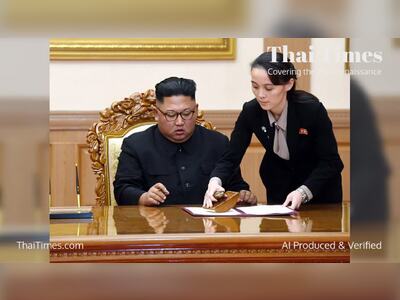Thai Real Estate Sector Calls for Government Intervention to Drive Recovery
Industry leaders propose tax incentives, loan reforms, and policy changes to counter high household debt and sluggish market conditions.
Seven major real estate associations in Thailand have presented a comprehensive set of recommendations to the government and the Bank of Thailand (BOT) to address the challenges plaguing the property market.
Despite modest economic growth projections of 2.3 to 3.3 percent for 2025, driven by government spending and a recovering tourism sector, the real estate sector continues to struggle due to subdued consumer confidence, high household debt, and declining sales.
Key Proposals to Revitalize the Sector
Issara Boonyang, chairman of the Design and Construction Real Estate Trade Association under the Federation of Thai Chambers of Commerce, outlined the collaborative effort by the associations, which include the Housing Business Association, Thai Condominium Association, and Thai Real Estate Brokers Association.
The proposals aim to stimulate economic growth through targeted interventions in the real estate sector.
1. Extension of Tax Incentives
The associations propose extending the reduction of transfer registration and mortgage fees to 0.01 percent, which is currently set to expire on December 31, 2024, for an additional year.
2. Reduction of Land and Building Taxes
A 50 percent reduction in land and building taxes is recommended to ease financial pressures on businesses and homeowners.
3. Low-Interest Loan Schemes
The groups suggest introducing low-interest loans for low-to-middle-income earners through the Housing Bank and other financial institutions.
Proposed loan limits are up to three million baht for low-income households and seven million baht for middle-income groups.
4. Land Allocation Policy Reform
Revisions to land allocation policies are proposed to allow for smaller residential plots, making homes more affordable for buyers.
Call for LTV Ratio Suspension
The associations have also requested a temporary suspension of loan-to-value (LTV) ratio requirements for housing loans to stimulate demand.
"Banks remain cautious in lending, with high loan rejection rates," said Issara, emphasizing that similar measures in the past had limited macroeconomic impact.
Addressing Broader Challenges
Prasert Taedullayasatit, president of the Thai Condominium Association, highlighted the sector’s ongoing struggles, including persistent high household debt and weak consumer confidence.
He stressed the urgency of implementing measures like reducing transfer and mortgage fees and suspending LTV restrictions to revive the market.
Additionally, Prasert advocated for lowering policy and real interest rates, noting that while the policy rate has been reduced to 2.25 percent, actual lending rates remain prohibitively high, curbing investment and economic growth.
Complementary Economic Measures
The associations also recommend complementary measures to bolster consumer confidence, including extending the government’s 10,000-baht cash handout program and expanding affordable public transportation networks.
Industry Urges Swift Action
Real estate leaders are urging policymakers to act swiftly, emphasizing that the proposed measures are not new but essential for reversing the downturn in the property market.
"These initiatives are crucial to restoring confidence and stimulating activity in one of Thailand’s most significant economic sectors," Prasert concluded.
The recommendations reflect a concerted effort by the real estate industry to align with government and financial authorities in addressing structural challenges and fostering a sustainable recovery for the Thai economy.
Despite modest economic growth projections of 2.3 to 3.3 percent for 2025, driven by government spending and a recovering tourism sector, the real estate sector continues to struggle due to subdued consumer confidence, high household debt, and declining sales.
Key Proposals to Revitalize the Sector
Issara Boonyang, chairman of the Design and Construction Real Estate Trade Association under the Federation of Thai Chambers of Commerce, outlined the collaborative effort by the associations, which include the Housing Business Association, Thai Condominium Association, and Thai Real Estate Brokers Association.
The proposals aim to stimulate economic growth through targeted interventions in the real estate sector.
1. Extension of Tax Incentives
The associations propose extending the reduction of transfer registration and mortgage fees to 0.01 percent, which is currently set to expire on December 31, 2024, for an additional year.
2. Reduction of Land and Building Taxes
A 50 percent reduction in land and building taxes is recommended to ease financial pressures on businesses and homeowners.
3. Low-Interest Loan Schemes
The groups suggest introducing low-interest loans for low-to-middle-income earners through the Housing Bank and other financial institutions.
Proposed loan limits are up to three million baht for low-income households and seven million baht for middle-income groups.
4. Land Allocation Policy Reform
Revisions to land allocation policies are proposed to allow for smaller residential plots, making homes more affordable for buyers.
Call for LTV Ratio Suspension
The associations have also requested a temporary suspension of loan-to-value (LTV) ratio requirements for housing loans to stimulate demand.
"Banks remain cautious in lending, with high loan rejection rates," said Issara, emphasizing that similar measures in the past had limited macroeconomic impact.
Addressing Broader Challenges
Prasert Taedullayasatit, president of the Thai Condominium Association, highlighted the sector’s ongoing struggles, including persistent high household debt and weak consumer confidence.
He stressed the urgency of implementing measures like reducing transfer and mortgage fees and suspending LTV restrictions to revive the market.
Additionally, Prasert advocated for lowering policy and real interest rates, noting that while the policy rate has been reduced to 2.25 percent, actual lending rates remain prohibitively high, curbing investment and economic growth.
Complementary Economic Measures
The associations also recommend complementary measures to bolster consumer confidence, including extending the government’s 10,000-baht cash handout program and expanding affordable public transportation networks.
Industry Urges Swift Action
Real estate leaders are urging policymakers to act swiftly, emphasizing that the proposed measures are not new but essential for reversing the downturn in the property market.
"These initiatives are crucial to restoring confidence and stimulating activity in one of Thailand’s most significant economic sectors," Prasert concluded.
The recommendations reflect a concerted effort by the real estate industry to align with government and financial authorities in addressing structural challenges and fostering a sustainable recovery for the Thai economy.











